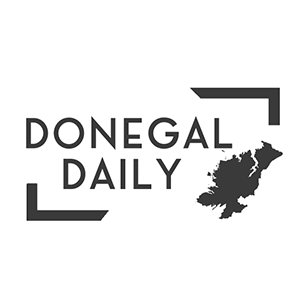IT WAS A day that drew the ‘loudest cheer heard from Finn Harps supporters since they won the Cup in 1974’.
The afternoon of October 23, 1983 had the pulses racing down Navenny Street.
A brace of goals by Brendan Bradley and a heroic afternoon by the goalkeeper, Declan McIntyre, saw Finn Harps hand Shamrock Rovers a first defeat of the season.
Such was the level of McIntyre’s performance, he was carried off the pitch by jubilant supporters.
‘Finn Park has not seen the likes of this for a long time,’ the Irish Independent reported.
McIntyre, it was later revealed, played 35 minutes with a broken finger – an injury that would put him out for the next two months.
The Donegal News outlined the dominance of Rovers in the game: ‘The unbiased among the large crowd will wonder at how Harps managed to withstand a blitz on the Harps defence that made the Battle of Britain look like child’s play.’

Declan McIntyre carried from the field after game against Shamrock Rovers
This, though, was just the fourth League game of the season. The giddiness in the ground would’ve been at home in a more advanced stage of the campaign, but the flames were burning in the early weeks.
Patsy McGowan, the then Harps manager, urged caution.
As he surveyed the celebrations, McGowan remarked that his team was ‘at the Romper Room stage’ – in reference to a TV series of the time aimed at pre-school children.
“We’re still building,” McGowan said.
A fourth successive win, a 3-2 win at home to Waterford, put Harps on their own at the top in November ’83.
McGowan hailed his team’s ‘spirit, fight and tenacity’.
“They are prepared to chase anything,” he said.
Similar traits could be garlanded at Ollie Horgan’s class of 2021.
Last Saturday’s come-from-behind 2-1 win over Waterford – sealed by a stunning injury-time strike by captain Dave Webster – maintained Harps’ unbeaten start to the season.
| FINN HARPS’ BEST PREMIER DIVISION STARTS | ||
| Season | How they started | Position |
| 1970/71 | won four of the first five games | 6th |
| 1972/73 | won the first three, went on to win nine of the first ten | 2nd |
| 1975/76 | won the first four games, then uneaten in nine | 2nd |
| 1977/78 | won the first four games, won eight of the first ten | 2nd |
| 1983/84 | unbeaten in the first 11 games | 9th |
“It’s great to dig it out,” Webster said afterwards. “That shows the character that we have. it was very pleasing to nick a winner.”
The absence of crowds, owing to the Covid-19 pandemic, is certainly depriving Finn Park of some of the old magic at the moment. With Harps having banked 10 points from a possible 12, the away end at The Showgrounds for Saturday’s derby clash against Sligo Rovers would be heaving.
The hope must be that Harps will be on a similar wave of results when crowds are welcomed back – not just for the hardcore who are surely agonising at having to watch the current run from afar, but for a future generation who could be gripped and hooked on those nights by the Finn when time stands still.
It certainly felt so when the ball flashed across the River End penalty area on Saturday, almost in slow motion, towards Webster, who had little more than a keyhole to aim for.
The moment deserved an audience; that adrenaline rush of the supporters clamouring down the concrete terrace steps, lost in those seconds of wildness.

Dave Webster (North West Newspix)
“We need to make Finn Park a hard place to come,” declared defender Shane McEleney.
“We kept going. We had the confidence to go and get the three points. There is great togetherness in the group, but we won’t get too ahead of ourselves.”
Horgan certainly won’t be getting carried away.
“You have got to be pleased, but it’s gone now,” he said of the weekend’s win, “but it doesn’t matter where you are after four games; it’s after 36 games.”
Very quickly, Horgan’s focus had turned to Sligo.
“This will be the biggest test we’ve had so far – and we’ve had very difficult tests,” the Harps manager said. “We have had it very difficult in Sligo and this is probably the best Sligo side in a long while.”

Ollie Horgan and Paul Hegarty (North West Newspix)
Horgan has managed to build a squad of some substance, belying Harps’ part-time status, and it’s a squad that now has depth and desire.
“There’s no reason we can’t push on,” Adam Foley, who has hit four goals in the opening four games, said.
“It took us a few weeks to gel last season, but when we did we knew we had the makings of a very good side.”
In Mark Anthony McGinley, Horgan has a top level goalkeeper, while the retention of the likes of Webster – now the captain – Kosovar Sadiki, Mark Russell and Karl O’Sullivan (who had seemed set to sign for Derry City in pre-season) has helped keep the foundations strong.
The arrival of Barry McNamee on the eve of the 2020 season was a real blue chip addition for Horgan and the Ramelton man is finding a groove again.
“Hard work first and foremost, but we have a lot of good players,” McNamee noted last weekend.
“We showed great character to get back. It’s a massive, massive three points. There was a different pressure on us and we got the right result.”

Barry McNamee (North West Newspix)
Tellingly, Horgan noted this week that he felt he had a ‘bigger panel of equal players’.
Ryan Shanley and Tunde Owolabi have yet to be unleashed from the off while it should not be forgotten that Harps are without Ryan Connolly and Conor Barry – who had started the season opener against Bohemians – not to mention Mark Timlin, another player from the top drawer.
These are certainly exciting times, but there are lessons from 1983 to be heeded.
Harps were unbeaten in their first eleven, drawing seven, but they won only four of the next 20 games and ended the season not even in the top half.
“They got themselves to the top, but they didn’t have the ability, mental strength, physical strength of the ambition to stay there,” McGowan said at the season’s end. The following season, McGowan was sacked and replaced by Bobby Toland with Harps relegated to the First Division – where they stayed until 1996.
Harps are in their third successive season in the top flight and, after battling to avoid the quicksands for the last two terms, the challenge now is, as Horgan put it in pre-season to go to ‘the next rung’.
It is almost five years now since Horgan recruited Paul Hegarty, a former Harps player and manager, to be his assistant. Upon his addition to the staff again, following the departure of Gavin Dykes, Hegarty outlined that it was time for Harps to ‘look up, not down’.
Their history, though, will tell them to take it one step at a time.
Tags:





